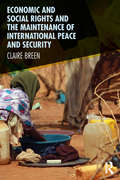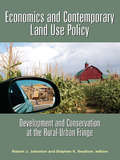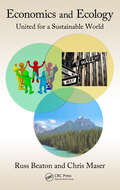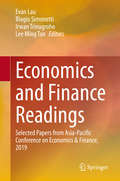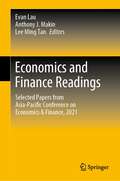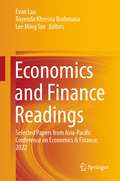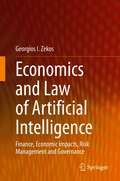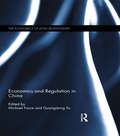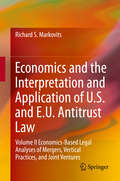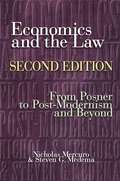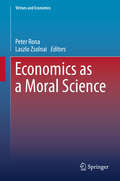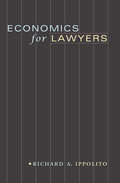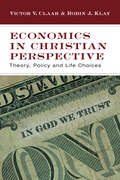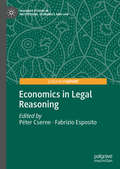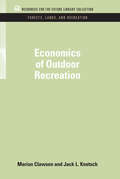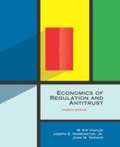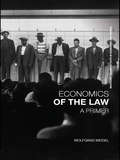- Table View
- List View
Economic and Social Rights and the Maintenance of International Peace and Security
by Claire BreenThis text comprises cutting-edge research on one of the greatest global challenges: the failure to address systematic economic and social exclusion, and attendant violations of economic and social rights (ESR), as a driver of conflict. The text explores what the UN's obligation to maintain international peace and security can mean when it is informed by the requirement to protect and promote ESR, rights that play a crucial role in maintaining international peace and security but which are often overlooked. The book considers the extent to which Security Council mandated peace operations have been informed by human rights and efforts to promote economic and social development. The approach is to analyse the extent to which the Security Council has interacted with the General Assembly, the Economic and Social Council as well as other Charter-based mechanisms such as the Human Rights Council, and its predecessor, with particular reference to the role of the Special Procedure Mechanisms. The role of the UN High Commissioner for Human Rights is also considered. In this way, the text shows that the connection between peace and security and human rights is well recognised by these organs. In addition, the text considers States’ ESR obligations stemming from the extraterritorial application of such rights in the context of peace operations. Given that States’ obligations stemming from ESR have often been neglected, the book examines how such provision could be improved using ESR-grounded plans reflecting the rights to health, food, water, education, work and life. The text concludes with a call to reimagine what international peace and security can look like when it is informed by the need to recognise the emergence of post-conflict legal obligations based on broader concepts of international peace and security that draw from ESR. This text will appeal to legal scholars, policy advisors, members of the military, those working in the area of development, NGOs and final-year undergraduate and/or postgraduate students working in the areas of international law, political science and international relations, and associated fields of research.
Economics Without Laws: Towards a New Philosophy of Economics
by Łukasz HardtThis book offers a vision of economics in which there is no place for universal laws of nature, and even for laws of a more probabilistic character. The author avoids interpreting the practice of economics as something that leads to the formulation of universal laws or laws of nature. Instead, chapters in the book follow the method of contemporary philosophy of science: rather than formulating suggestions for practicing scientists of how they should do research, the text describes and interprets the very practice of scientific research. This approach demonstrates how economists can explain economic phenomena not by subsuming them under general laws, but rather by building models of these phenomena, by referring to causes, or even by investigating what is in the nature of given factors, events, or circumstances to produce.
Economics and Contemporary Land Use Policy: Development and Conservation at the Rural-Urban Fringe
by Robert J. Johnston Stephen K. SwallowAs external forces increase the demand for land conversion, communities are increasingly open to policies that encourage conservation of farm and forest lands. This interest in conservation notwithstanding, the consequences of land-use policy and the drivers of land conversions are often unclear. One of the first books to deal exclusively with the economics of rural-urban sprawl, Economics and Contemporary Land-Use Policy explores the causes and consequences of rapidly accelerating land conversions in urban-fringe areas, as well as implications for effective policy responses. This book emphasizes the critical role of both spatial and economic-ecological interactions in contemporary land use, and the importance of a practical, policy-oriented perspective. Chapters illustrate an interaction of conceptual, theoretical, and empirical approaches to land-use policy and highlight advances in policy-oriented economics associated with the conservation and development of urban-fringe land. Issues addressed include (1) the appropriate role of economics in land-use policy, (2) forecasting and management of land conversion, (3) interactions among land use, property values, and local taxes, and (4) relationships among rural amenities, rural character, and urban-fringe land-use policy. Economics and Contemporary Land-Use Policy is a timely and relevant contribution to the land-use policy debate and will prove an essential reference for policymakers at the local, state, and federal levels. It will also be of interest to students, academics, and anyone with an interest in the practical application of economics to land-use issues.
Economics and Ecology: United for a Sustainable World (Social Environmental Sustainability)
by Chris Maser Charles R. BeatonThe earth, our home, is in crisis. There are two sides to this crisis-our global economy, and its effect on the ecology of our home planet. Despite conventional thinking that typical monetary and fiscal manipulations will put us back on the path of economic growth, the reality is not that simple. Meanwhile, the natural environment is sending unmist
Economics and Finance Readings: Selected Papers from Asia-Pacific Conference on Economics & Finance, 2019
by Evan Lau Lee Ming Tan Irwan Trinugroho Biagio SimonettiThis book is a compilation of the best papers presented at the APEF 2019 conference which was held on 25th and 26th July 2019 at the Grand Copthorne Waterfront in Singapore. With a great number of submissions, it presents the latest research findings in economics and finance and discusses relevant issues in today's world. The book is a useful resource for readers who want access to economics, finance and business research focusing on the Asia-Pacific region.
Economics and Finance Readings: Selected Papers from Asia-Pacific Conference on Economics & Finance, 2021
by Evan Lau Anthony J. Makin Lee Ming TanThis book is a compilation of the best papers presented at the 2022 edition of the Asia-Pacific Conference on Economics & Finance (APEF), which is held annually in Singapore. With a great number of submissions, it presents the latest research findings in economics and finance and discusses relevant issues in today's world. The book is a useful resource for readers who want access to economics, finance and business research focusing on the Asia-Pacific region. The APEF 2021 conference was conducted virtually due to the Covid-19 pandemic.
Economics and Finance Readings: Selected Papers from Asia-Pacific Conference on Economics & Finance, 2022
by Evan Lau Lee Ming Tan Rayenda Khresna BrahmanaThis book is a compilation of the best papers presented at the 2022 Asia-Pacific Conference on Economics & Finance (APEF), which is held annually in Singapore. With a great number of submissions, it presents the latest research findings in economics and finance and discusses relevant issues in today's world. The book is a useful resource for readers who want access to economics, finance and business research focusing on the Asia-Pacific region.2023 Asia-Pacific Conference on Economics & Finance (APEF) will take place on the 14-15 Dec 2023 in Singapore.
Economics and Law of Artificial Intelligence: Finance, Economic Impacts, Risk Management and Governance
by Georgios I. ZekosThis book presents a comprehensive analysis of the alterations and problems caused by new technologies in all fields of the global digital economy. The impact of artificial intelligence (AI) not only on law but also on economics is examined. In the first part, the economics of AI are explored, including topics such as e-globalization and digital economy, corporate governance, risk management, and risk development, followed by a quantitative econometric analysis which utilizes regressions stipulating the scale of the impact. In the second part, the author presents the law of AI, covering topics such as the law of electronic technology, legal issues, AI and intellectual property rights, and legalizing AI. Case studies from different countries are presented, as well as a specific analysis of international law and common law. This book is a must-read for scholars and students of law, economics, and business, as well as policy-makers and practitioners, interested in a better understanding of legal and economic aspects and issues of AI and how to deal with them.
Economics and Property
by Danny MyersThis text focuses on the introduction of economic principles to provide an understanding of the commercial and residential property sectors and the markets for development, construction and occupation of property.Economics and Property supports students following property economics courses leading to a career in the property profession. Experience suggests that economics can initially be perceived as challenging; this book makes the subject clear and comprehensible.Extracts and examples from the Estates Gazette and its electronic archive EGi are used to provide examples and raise questions for discussion. Glossaries, key learning points and a clear layout make this book the best introduction to economics for the property profession.
Economics and Property: The Estates Gazette Guide
by Danny Myersa clear and easy-to-read introduction to any property economics module in a degree leading to a profession in real estate, surveying, construction and other related built environment fields Full colour figures and packed with features such as: glossary, chapter objectives and summaries, glossary, case studies, tutorial readings
Economics and Regulation in China (The Economics of Legal Relationships #17)
by Guangdong Xu Michael FaureThis book, from a top international group of scholars, explores the ways in which economic tools can be used to improve the quality of regulation in general and legislative tools in particular. As the role of law becomes increasingly important in China, the question arises of how effective regulatory and legislative tools can be developed to accompany the Chinese evolution towards a welfare state. China therefore provides a unique case study for scholars and policymakers interested in examining how regulation can play a role in promoting sustainable development. Economics and Regulation in China goes beyond traditional economic analysis of law by focusing specifically on the question of how economic tools can guide the quality of legislation. To this end, the book centres in on three areas: regulation as a tool of economic growth, competition policy and environmental policy. Not only are these three domains of great importance for China, but they are also relevant for a broad scholarship interested in the economic analysis of law. This volume contributes to discussions on how ex-ante evaluation of legislative proposals and ex-post analysis can increase the effectiveness and efficiency of regulation, using economic tools, offering insights that go beyond the particular case of China. The analysis offered by this book makes it an invaluable resource for academics and policymakers alike.
Economics and the Interpretation and Application of U.S. and E.U. Antitrust Law: Volume I
by Richard S. MarkovitsThis volume (1) defines the specific-anticompetitive-intent, lessening-competition, distorting-competition, and exploitative-abuse tests of illegality promulgated by U.S. and/or E.U. antitrust law, (2) compares the efficiency defenses promulgated by U.S. and E.U. antitrust law, (3) compares the conduct-coverage of the various U.S. and E.U. antitrust laws, (4) defines price competition and quality-or-variety-increasing-investment (QV-investment) competition and explains why they should be analyzed separately, (5) defines the components of individualized-pricing and across-the-board-pricing sellers’ price minus marginal cost gaps and analyses each’s determinants, (6) defines the determinants of the intensity of QV-investment competition and explains how they determine that intensity, (7) demonstrates that definitions of both classical and antitrust markets are inevitably arbitrary, not just at their periphery but comprehensively, (8) criticizes the various protocols for market definition recommended/used by scholars, the U.S. antitrust agencies, the European Commission, and U.S. and E.U. courts, (9) explains that a firm’s economic (market) power or dominance depends on its power over both price and QV investment and demonstrates that, even if markets could be defined non-arbitrarily, a firm’s economic power could not be predicted from its market share, (10) articulates a definition of “oligopolistic conduct” that some economists have implicitly used–conduct whose perpetrator-perceived ex ante profitability depended critically on the perpetrator’s belief that its rivals’ responses would be affected by their belief that it could react to their responses, distinguishes two types of such conduct–contrived and natural–by whether it entails anticompetitive threats and/or offers, explains why this distinction is critical under U.S. but not E.U. antitrust law, analyzes the profitability of each kind of oligopolistic conduct, examines these analyses’ implications for each’s antitrust legality, and criticizes related U.S. and E.U. case-law and doctrine and scholarly positions (e.g., on the evidence that establishes the illegal oligopolistic character of pricing), and (11) executes parallel analyses of predatory conduct--e.g., criticizes various arguments for the inevitable unprofitability of predatory pricing, the various tests that economists/U.S. courts advocate using/use to determine whether pricing is predatory, and two analyses by economists of the conditions under which QV investment and systems rivalry are predatory and examines the conditions under which production-process research, plant-modernization, and long-term full-requirements contracts are predatory.
Economics and the Interpretation and Application of U.S. and E.U. Antitrust Law: Volume II
by Richard S. MarkovitsVolume 2 uses the economic and legal concepts/theories of Volume 1 to (1) analyze the U.S. and E.U. antitrust legality of mergers, joint ventures, and the pricing-technique and contractual/sales-policy distributor-control surrogates for vertical integration and (2) assess related positions of scholars and U.S. and E.U. antitrust officials. Its analysis of horizontal mergers (1) delineates non-market-oriented protocols for determining whether they manifest specific anticompetitive intent, would lessen competition, or are rendered lawful by the efficiencies they would generate, (2) criticizes the U.S. courts’ traditional market-share/market-concentration protocol, the HHI-oriented protocols of the 1992 U.S. DOJ/FTC Guidelines and the European Commission (EC) Guidelines, and the various non-market-oriented protocols the DOJ/FTC have increasingly been using, (3) argues that, although the 2010 U.S. Guidelines and DOJ/FTC officials discuss market definition as if it matters, those Guidelines actually reject market-oriented approaches, and (4) reviews the relevant U.S. and E.U. case-law. Its analysis of conglomerate mergers (1) shows that they can perform the same legitimate and competition-increasing functions as horizontal mergers and can yield illegitimate profits and lessen competition by increasing contrived oligopolistic pricing and retaliation barriers to investment, (2) analyzes the determinants of all these effects, and (3) assesses limit-price theory, the toe-hold-merger doctrine, and U.S. and E.U. case-law. Its analysis of vertical conduct (1) examines the legitimate functions of each type of such conduct, (2) delineates the conditions under which each manifests specific anticompetitive intent and/or lessens competition, and (3) assesses related U.S. and E.U. case-law and DOJ/FTC and EC positions. Its analysis of joint ventures (1) explains that they violate U.S. law only when they manifest specific anticompetitive intent while they violate E.U. law either for this reason or because they lessen competition, (2) discusses the meaning of an “ancillary restraint” and demonstrates that whether a joint-venture agreement would be illegal if it imposed no restraints and whether any restraints imposed are ancillary can be determined only through case-by-case analysis, (3) explains why scholars and officials overestimate the economic efficiency of R&D joint ventures, and (4) discusses related U.S. and E.U. case-law and DOJ/FTC and EC positions. The study’s Conclusion (1) reviews how its analyses justify its innovative conceptual systems and (2) compares U.S. and E.U. antitrust law as written and as applied.
Economics and the Law: From Posner to Postmodernism and Beyond - Second Edition
by Steven G. Medema Nicholas MercuroThis is an expanded second edition of Nicholas Mercuro and Steven Medema's influential book Economics and the Law, whose publication in 1998 marked the most comprehensive overview of the various schools of thought in the burgeoning field of Law and Economics. Each of these competing yet complementary traditions has both redefined the study of law and exposed the key economic implications of the legal environment. The book remains true to the scope and aims of the first edition, but also takes account of the field's evolution. At the book's core is an expanded discussion of the Chicago school, Public Choice Theory, Institutional Law and Economics, and New Institutional Economics. A new chapter explores the Law and Economics literature on social norms, today an integral part of each of the schools of thought. The chapter on the New Haven and Modern Civic Republican approaches has likewise been expanded. These chapters are complemented by a discussion of the Austrian school of Law and Economics. Each chapter now includes an "At Work" section presenting applications of that particular school of thought. By providing readers with a concise, noncritical description of the broad contours of each school, this book illuminates the fundamental insights of a field with important implications not only for economics and the law, but also for political science, philosophy, public administration, and sociology.
Economics as a Moral Science (Virtues and Economics #1)
by Laszlo Zsolnai Peter RonaThe book is reclaiming economics as a moral science. It argues that ethics is a relevant and inseparable aspect of all levels of economic activity, from individual and organizational to societal and global. Taking ethical considerations into account is needed in explaining and predicting the behavior of economic agents as well as in evaluating and designing economic policies and mechanisms. The unique feature of the book is that it not only analyzes ethics and economics on an abstract level, but puts behavioral, institutional and systemic issues together for a robust and human view of economic functioning. It sees economic “facts” as interwoven with human intentionality and ethical content, a domain where utility calculations and moral considerations co-determine the behavior of economic agents and the outcomes of their activities. The book employs the personalist approach that sees human persons – endowed with free will and conscience – as the basic agents of economic life and defines human flourishing as the final end of economic activities. The book demonstrates that economics can gain a lot in meaning and also in analytical power by reuniting itself with ethics.
Economics for Environmental Professionals
by Frank R. SpellmanEnvironmental professionals are often called upon to find solutions to environmental degradation problems or to lead the way in planning to prevent them. Because they come mainly from the environmental and science disciplines, most environmental professionals have limited training in the fundamentals of economics. This book is designed to provide t
Economics for Environmental Studies: A Strategic Guide to Micro- and Macroeconomics
by Alfred Endres Volker RadkeAn understanding of fundamental economic concepts is essential for students in environmental studies programs around the world. The present textbook addresses their needs, providing a concise introduction to micro- and macroeconomics and demonstrating how these economic tools and approaches can be used to analyze environmental issues. Written in an accessible style without compromising depth of the analysis, central issues in the public policy debate on environmental problems and environmental policy are discussed and analyzed from an economics perspective. The book is meant both as an introductory text for undergraduate students in environmental sciences without a background in economics, and as a companion for economists interested in a presentation of the micro and macro foundations of environmental economics, in a nutshell.
Economics for Environmental Studies: A Strategic Guide to Micro- and Macroeconomics (Springer Texts in Business and Economics)
by Alfred Endres Volker RadkeThis textbook provides a concise introduction to micro- and macroeconomics and demonstrates how economic tools and approaches can be used to analyze environmental issues. Written in an accessible style without compromising depth of the analysis, central issues in the public policy debate on environmental problems and environmental policy are discussed and analyzed from an economics perspective. The book is meant as an introductory (and in some parts intermediate) text for undergraduate students in environmental sciences without a background in economics. It also serves as a companion for economists interested in a presentation of the micro and macro foundations of environmental economics, in a nutshell.The second edition has been revised, updated and extended in may ways, for instance by adding a microeconomic section on environmental technical change, a discussion of the significance of technical change for a sustainable development and a considerably extended macroeconomic section on economic growth.
Economics for Environmental Studies: A Strategic Guide to Micro- and Macroeconomics (Springer Texts in Business and Economics)
by Alfred Endres Volker RadkeAn understanding of fundamental economic concepts is essential for students in environmental studies programs around the world. The present textbook addresses their needs, providing a concise introduction to micro- and macroeconomics and demonstrating how these economic tools and approaches can be used to analyze environmental issues. Written in an accessible style without compromising depth of the analysis, central issues in the public policy debate on environmental problems and environmental policy are discussed and analyzed from an economics perspective.The book is meant both as an introductory text for undergraduate students in environmental sciences without a background in economics, and as a companion for economists interested in a presentation of the micro and macro foundations of environmental economics, in a nutshell.
Economics for Lawyers
by Richard A. IppolitoWhether dealing with contracts, tort actions, or government regulations, lawyers are more likely to be successful if they are conversant in economics. Economics for Lawyers provides the essential tools to understand the economic basis of law. Through rigorous analysis illustrated with simple graphs and a wide range of legal examples, Richard Ippolito focuses on a few key concepts and shows how they play out in numerous applications. There are everyday problems: What is the social cost of legislation enforcing below-market prices, minimum wages, milk regulation, and noncompetitive pricing? Why are matinee movies cheaper than nighttime showings? And then there are broader questions: What is the patent system's role in the market for intellectual property rights? How does one think about externalities like airport noise? Is the free market, a regulated solution, or tort law the best way to deliver the "efficient amount of harm" in the workplace? What is the best approach to the question of economic compensation due to a person falsely imprisoned? Along the way, readers learn what economists mean when they talk about sorting, signaling, reputational assets, lemons markets, moral hazard, and adverse selection. They will learn a new vocabulary and a whole new way of thinking about the world they live in, and will be more productive in their professions.
Economics in Christian Perspective: Theory, Policy and Life Choices
by Victor V. Claar Robin J. KlayUnemployment. Environmental damage. Poverty. Economists Victor Claar and Robin Klay critically engage mainstream economic theory and policy recommendations to provide guidance for faithfully and responsibly addressing these and other important economic issues. Affirming that a just and prosperous society depends for its continued success on maintaining the right balance of power among three principal spheres--democratic governments, market-organized economies, and strong moral and cultural institutions--Claar and Klay demonstrate how Christian principles and values guide and undergird a flourishing and just economy. This text is for use in any course needing a survey of the principles of economics.
Economics in Legal Reasoning (Palgrave Studies in Institutions, Economics and Law)
by Péter Cserne Fabrizio EspositoThis Palgrave Pivot is the first book in the field of Law & Economics looking at the relationship between economics and law in legal reasoning. The book constitutes a reference point for the economic analysis of legal institutions, as legal reasoning remains the dimension of legal systems least explored by economists.Despite their differences, economics and legal reasoning interact in many interesting ways. This book offers a fast track to these interactions. Both supporters and critics of Law & Economics will be exposed to a yet-to-be developed area of interaction between the disciplines.This book will be of interest to economists, legal scholars, and Law and Economics specialists, and can be used as teaching material in courses on Law & Economics and legal reasoning as well.
Economics of Outdoor Recreation: Economics Of Outdoor Recreation (RFF Forests, Lands, and Recreation Set)
by Marion Clawson Jack L. KnetschThis book is one of the first to supply the means for evaluating recreational resources in economic terms. Originally published in 1967.
Economics of Regulation and Antitrust (4th edition)
by W. Kip Viscusi Joseph E. Harrington John M. VernonThis new edition of the leading text on business and government focuses on the insights economic reasoning can provide in analyzing regulatory and antitrust issues. Departing from the traditional emphasis on institutions, Economics of Regulation and Antitrust tasks how economic theory and empirical analysis can illuminate the character of market operation and the role for government action and brings new developments in theory and empirical methodology to bear on these questions. The fourth edition has been substantially revised and updated throughout, with new material added and extended discussion of many topics. Part I, on antitrust, has been given a major revision to reflect advances in economic theory and recent antitrust cases, including the case against Microsoft and the Supreme Court's Kodak decision. Part II, on economic regulation, updates its treatment of the restructuring and deregulation of the telecommunications and electric power industries, and includes an analysis of what went wrong in the California energy market in 2000 and 2001. Part III, on social regulation, now includes increased discussion of risk-risk analysis and extensive changes to its discussion of environmental regulation. The many case studies included provide students not only pertinent insights for today but also the economic tools to analyze the implications of regulations and antitrust policies in the future. The book is suitable for use in a wide range of courses in business, law, and public policy, for undergraduates as well at the graduate level. The structure of the book allows instructors to combine the chapters in various ways according to their needs. Presentation of more advanced material is self-contained. Each chapter concludes with questions and problems.
Economics of the Law: A Primer (Routledge Advanced Texts in Economics and Finance)
by Wolfgang WeigelThere is an ever-increasing interest in the question of how and why legal norms can effectively guide human action. This compact volume demonstrates how economic tools can be used to examine this question and scrutinize these legal norms. Indeed, this is one of the first text to be based on civil law instead of the more usual common law, situating the study of both private and public law within the framework of institutional economics, with recommendations for further reading and a list of key terms in each chapter. Besides the standard economic problems in property, tort, contract, crime and litigation, areas covered include: new institutional economics public choice constitutional law public administrations regulatory impact analysis. This book is essential reading for students in law schools and economics departments alike, particularly those engaged with the methodology of law and economics, applied economics and economic methods of legal policy.
